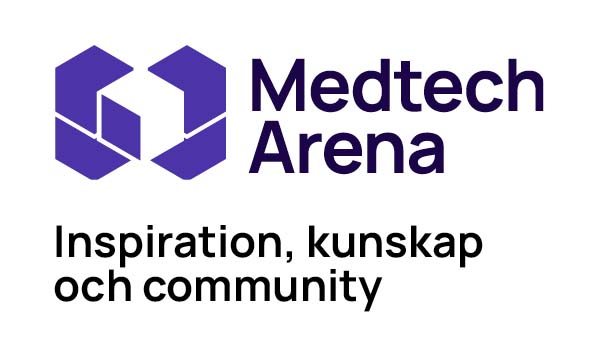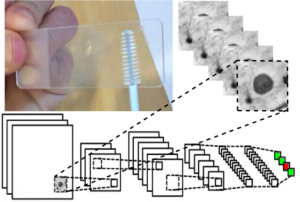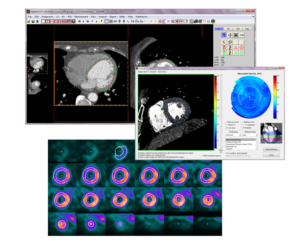
overviewpicture_large_study_cohorts
AIDA beviljar medel till AI-projekt
I den första ansökningsomgången har AIDAs styrgrupp beviljat medel till tre projekt. Projekten kommer att samlas i Linköping under en vecka i månaden för att ta del av AIDAs infrastruktur och att lära av varandra.
Image- and AI-based cytological cancer screening
Joakim Lindblad, PhD
Uppsala University
Oral cancer incidence is rapidly increasing worldwide, with over 450,000 new cases found each year. The most effective way of decreasing cancer mortality is early detection, which makes routine screening of patient risk groups highly desired. However, screening for oral cancer is not feasible with today’s methods that rely on painful tissue sampling and laborious manual examination by a medical expert. A consequence is that oral cancer is often discovered as late as when it has metastasized to another location. Prognosis at this stage of discovery is significantly worse than when it is caught in a localized oral area.
We will develop a system that uses artificial intelligence (AI) to automatically detect oral cancer in microscopy images of brush samples, which can quickly and without pain be routinely taken at ordinary dental clinics. We expect that the proposed approach will be crucial for introducing a screening program for oral cancer at dental clinics, in Sweden and the world. The project, which involves researchers from Uppsala University, Karolinska University Hospital, Folktandvården Stockholms län AB, and the Regional Cancer Center in Kerala, India, will greatly benefit from AIDA to turn developed methods into clinically useful tools.
Platform for efficient processing of large study cohorts
Einar Heiberg, PhD
Medviso AB
New medical guidelines need large clinical studies to improve and change medical treatment and patient management. Currently, there is an unmet need for efficient tools that can analyze imaging data from large-scale study cohorts with 1,000-100,000 patients. Machine learning has a critical role in the analysis of large study cohorts, and may provide a paradigm shift in how support tools for clinical decision are developed.
Existing clinical analysis software packages are not adequate for analyzing large patient cohorts. The main reasons are 1) Workflow is not streamlined enough. 2) Manual interactions are required to load/save data and batch processing are lacking. 3) Existing tools do not save the results in an open format that allows re-processing to extract new data or for use with machine learning approaches.
Medviso has in close collaboration with Department of Clinical Physiology developed the software Segment for medical image analysis. This software platform is freely available for research purposes.
The purpose of his project is to improve the existing software platform with tools adopted to process large study cohorts to overcome all above obstacles.
AI Based Tumor Definition for Improved and Milder Radiation Therapy
Carl Sieversson
Spectronic Medical AB
The result of our development project will be used by physicians for planning of radiation therapy. In today’s radiotherapy, a physician manually delineates the exact contours of the tumor in a three-dimensional MR image. Based on this delineation, a set of intensity modulated radiation beams are directed towards the tumor, subjecting the tumor to the intended radiation dose while avoiding excessive radiation to sensitive surrounding healthy tissue. However, manually delineating a tumor is a time-consuming work characterized by a great deal of individual variation and uncertainty regarding the exact boundaries of the volume to be included. Recent scientific publications identify this arbitrariness as one of the largest sources of error in modern radiation therapy. The outcome of our development project will provide physicians with an automatically delineated target volume which can be used as a starting point for further manual refinements. These delineations will be generated by a deep-learning based software, which adaptively improves itself by studying how different physicians outlines different types of tumors.
AKTUELLT
Elva medicintekniska projekt tar ett kompetenskliv
Medtech4Healths utlysning Kompetensförstärkning i småföretag 2025 har beviljat ytterligare tio företagsprojekt finansiering.
Ny projektansökningsomgång i AIDA
AIDA är en nationell arena för forskning och innovation inom AI för medicinsk bildanalys. Inom AIDA finns det flera möjligheter till projektstöd.
Vilken roll ges medicintekniken i den nya Life science-strategin?
Under Medicinteknikdagarna sätter Medtech4Health fokus på den nationella Life science-strategin och forsknings- och innovationspropositionen. Vilken plats får medicintekniken, och hur går vi från strategi till verkstad?
Missa inte rabatten till Framtidens hälsa och sjukvård
Medtech4Health är samarbetspartner till evenemanget vilket ger dig 50 procents rabatt på både tvådagars- och endagsbiljetter.
NYHETSBREV
Följ nyheter och utlysningar från Medtech4Health - prenumera på vårt nyhetsbrev.




